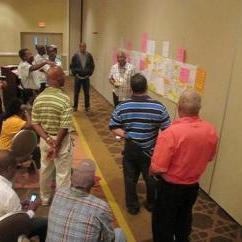
Port of Spain. November 13, 2014 - Over 19 fisherfolk leaders from 16 CARICOM countries, and representatives from the Caribbean Natural Resources Institute (CANARI), Caribbean Regional Fisheries Mechanism (CFRM), Centre for Resource Management and Environmental Studies of the University of the West Indies (UWI-CERMES), and The Nature Conservancy (TNC) participated in the Second Regional Workshop for the Caribbean Fisherfolk Action Learning Group, during October 20 - 24, 2014, in The Bahamas.
The Honourable V. Alfred Gray, Minister of Agriculture, Marine Resources and Local Government, made brief remarks on October 22, 2014. He noted that he had to attend the workshop because “when fisherfolk meet, you listen”. In his remarks, he endorsed the Bahamas Commercial Fisheries Alliance, and lauded its President, Mr. Adrian LaRoda for his aggressive representation of fishers in the Bahamas. He also indicated that the Bahamian government had a paper before it which would allow “only Bahamians to fish in Bahamian waters”. In addition, he mentioned that the government had embarked on a new programme to educate Bahamians about marine and agricultural sciences. This was being done through the Bahamas Agriculture and Marine Science Institute (BAMSI) which was opened on September 29th, 2014 in North Andros, Bahamas. The Minister pointed out that Andros was the ideal place for such an institute because of the vast abundance of land and sea resources that the island possesses.
During the workshop, participants reviewed the actions implemented under the project to date (including the launch of the Fisherfolk Strengthening Fund); examined challenges facing fisherfolk leaders in enhancing personal skills and knowledge in order to effectively lead their organisaions; developed a strategy and action plan for the formalisation of the Caribbean Network of Fisherfolk Organisations; participated in the analysis of key fisheries policies to determine the implications for sustainable small-scale fisheries development in the Caribbean; and contributed to the development of a participatory video with a local fishing community in The Bahamas. The completed video will highlight the scourge of illegal, unregulated and unreported fishing (IUU fishing) in The Bahamas and the region as a whole, and propose actions to deal with these illegal activities.
The workshop was convened under the 1,032,099 Euro European Union funded project Enhancing food security from the fisheries sector in the Caribbean: Building the capacity of regional and national fisherfolk organisation networks to participate in fisheries governance and management, which is targeting fisherfolk organisations in the countries of Anguilla, Antigua and Barbuda, The Bahamas, Belize, Barbados, Dominica, Grenada, Guyana, Haiti, Jamaica, Montserrat, Saint Lucia, St Kitts and Nevis, St Vincent and the Grenadines, Suriname, Trinidad and Tobago and Turks and Caicos. It is being implemented by the Caribbean Natural Resources Institute (CANARI), working in partnership with the Centre for Resource Management and Environmental Studies of the University of the West Indies (UWI-CERMES), Panos Caribbean, Caribbean Network of Fisherfolk Associations (CNFO) and the Caribbean Regional Fisheries Mechanism (CFRM).
- Login to post comments


Recent comments
9 years 12 weeks ago
9 years 32 weeks ago
9 years 36 weeks ago
9 years 39 weeks ago
9 years 40 weeks ago
12 years 7 weeks ago
12 years 21 weeks ago
12 years 41 weeks ago